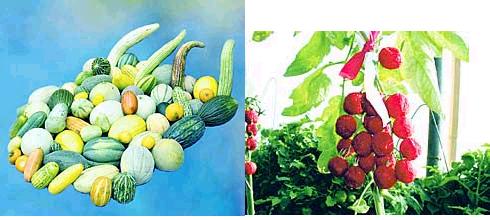The tomatoes ripen, grow and turn into raisins - and the melons turn into cucumbers
Merit Sloin

New varieties of fruits and vegetables, with surprising flavors and unusual shapes, have been filling the shelves of supermarkets and vegetable shops in recent years.
These days, at the Volcani Institute, a new type of tomato is being developed by cross-breeding, which does not exist in nature: raisin tomatoes, which dry and shrivel naturally on the bush. During the ripening process they gradually lose water, the sugar and vitamins become more concentrated and within two weeks they turn into raisins. "The tomato varieties found on the market never shrink in the wild or on the shelf," says Dr. Ari Shafer, who coordinates the "Taste Tomatoes" breeding project at the institute, in collaboration with the Gedera seeds company. "The reason for this," according to Shafer, "is that the tomato is covered with a fatty substance called cuticle, which seals the fruit and prevents water from evaporating. In the raisin tomatoes, thanks to a genetic trait that determines the structure of the fruit skin, there are tiny cracks in the cuticle that allow water to escape, and this is how we get naturally dried and whole tomatoes." It was the doctoral student Ran Hovav who managed to isolate the gene responsible for this.
Apart from the use in chefs' kitchens, the raisin tomatoes will have an advantage in the food industry. Instead of transporting the tomatoes to the factory, crushing them and drying the pulp, the drying in the field will allow less than half the volume to be transported to the factory, which will lower the production cost.
The raisin tomatoes have already been given a name: Tomaisins (a combination of the words "tomato" and "raisins" in English), and this is also the name of the company that was established for the purpose of commercially developing the special variety.
At the same time as the development of the raisin tomatoes, research teams from the Department of Genetics and Vegetables are working on improving the taste of the melons. "Our strategy is to search the global collection of melons for types with interesting properties," says Shaffer, "for this purpose, they established the Center for Fruit Quality in Pumpkins at the Institute, with the aim of locating melon types that excel in quality components such as sugar, various acids, pigments and aroma and the genes involved in determining these components , to develop special products. We found about a hundred genes responsible for the main components of the fruit's quality."
During the research, several previously unknown enzymes were found, which have potential biotechnological implications. Among other things, the researchers found an enzyme called "alpha galactosidase", which breaks down the sugars in the hotel. These sugars are also found in all legumes. The animals, including humans, that feed on the legumes do not have an enzyme that breaks them down. During digestion, they reach the large intestine, where they are broken down by bacteria and gases are formed." According to Shafer, "this enzyme, which will be produced by biotechnological methods, can be used to break down these sugars in soy milk, for example, and prevent the formation of gas in babies who are fed the product."
From one of the strange melons, which tastes sour, Dr. Yossi Burger, who is responsible for the genetic collection of the melons, produced a new type of fruit: a sweet-sour melon whose taste is reminiscent of exotic fruits, such as mango and pineapple. "We collected melons from the pool and after learning about the inheritance of the sourness trait in the hotel, we developed a new type of melon, which does not exist in nature, that combines sweetness with sourness. And it's all about the purity of classical cultivation without genetic engineering," says Shafer.
In order to market the new hotel, the research team is looking for an original form for it. "It is important that the sweet and sour melon does not look like a normal melon, because then people will wonder about the strange taste, so we are now looking for a melon with a different shape, perhaps cucumber-like, so that people will recognize the shape with the taste."
The genome scientist - plants
https://www.hayadan.org.il/BuildaGate4/general2/data_card.php?Cat=~~~747828972~~~27&SiteName=hayadan
